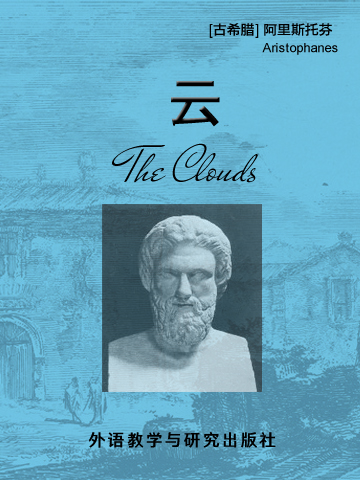STREPSIADES (sitting up)
GREAT gods! will these nights never end? will daylight never come? I heard the cock crow long ago and my slaves are snoring still! Ah! Ah! It wasn't like this formerly. Curses on the war! has it not done me ills enough? Now I may not even chastise my own slaves. Again there's this brave lad, who never wakes the whole long night, but, wrapped in his five coverlets, farts away to his heart's content. (He lies down) Come! let me nestle in well and snore too, if it be possible....oh! misery, it's vain to think of sleep with all these expenses, this stable, these debts, which are devouring me, thanks to this fine cavalier, who only knows how to look after his long locks, to show himself off in his chariot and to dream of horses! And I, I am nearly dead, when I see the moon bringing the third decade in her train and my liability falling due....Slave! light the lamp and bring me my tablets. (The slave obeys.) Who are all my creditors? Let me see and reckon up the interest. What is it I owe?....Twelve minae to Pasias....What! twelve minae to Pasias?....Why did I borrow these? Ah! I know! It was to buy that thoroughbred, which cost me so much. How I should have prized the stone that had blinded him!
PHIDIPPIDES (in his sleep)
That's not fair, Philo! Drive your chariot straight, I say.
STREPSIADES
This is what is destroying me. He raves about horses, even in his sleep.
PHIDIPPIDES (still sleeping)
How many times round the track is the race for the chariots of war?
STREPSIADES
It's your own father you are driving to death....to ruin. Come! what debt comes next, after that of Pasias?....Three minae to Amynias for a chariot and its two wheels.
PHIDIPPIDES (still asleep)
Give the horse a good roll in the dust and lead him home.
STREPSIADES
Ah! wretched boy! it's my money that you are making roll. My creditors have distrained on my goods, and here are others again, who demand security for their interest.
PHIDIPPIDES (awaking)
What is the matter with you, father, that you groan and turn about the whole night through?
《云》讲述了这样一个故事:斯瑞普斯阿得斯因为他的债主将要送他上公堂,因此身处困境,郁闷之极。如今,斯瑞普斯阿得斯必须想出一个万全之策来躲避债主。于是,他想到了苏格拉底和思想所。因为只要付钱给苏格拉底,他就会教人用诡辩术颠倒是非,打赢一切官司。见到苏格拉底之后,他一方面感叹这个人的才华,另一方面又羞愧自己的年老呆滞,不得不被苏格拉底赶出了思想所。无奈之下,他央求自己的儿子前来学习。不料,虽然儿子学会了如何说服债主欠钱不还,但却在宴会上殴打父亲,并用诡辩给出了充分理由。斯瑞普斯阿得斯一气之下,一把火烧了苏格拉底的思想所。
The Clouds is a comedy written by the celebrated playwright Aristophanes lampooning intellectual fashions in classical Athens. It was originally produced at the City Dionysia in 423 BC and it was not well received, coming last of the three plays competing at the festival that year. It was revised between 420-417 BC and thereafter it was circulated in manuscript form. No copy of the original production survives, and scholarly analysis indicates that the revised version is an incomplete form of Old Comedy. This incompleteness, however, is not obvious in translations and modern performances. The Clouds can be considered not only the world's first extant 'comedy of ideas' but also a brilliant and successful example of that genre. The play gained notoriety for its caricature of Socrates ever since its mention in Plato's Apology as a factor contributing to the philosopher's trial and execution.
- CLOUDS
- 书评 写书评
- 笔记
-
书评加载中...























 京公网安备 11010802032529号
京公网安备 11010802032529号
笔记加载中...